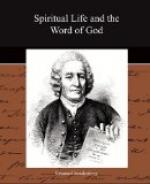To man alone is it granted to think as if of himself about good and evil, that is, that good must be loved and done because it is Divine and remains to eternity, and that evil must be hated and not done because it is devilish and remains to eternity. To think thus is not granted to any beast. A beast can do good and shun evil, yet not of itself, but either from instinct or habit or fear, and never from the thought that such a thing is a good or an evil, thus not of itself. Consequently, one who would have it believed that man shuns evils or does goods not as if of himself but from an imperceptible influx, or from the imputation of the Lord’s merit, would also have it believed that man lives like a beast, without thought of, or perception of, or affection for, truth and good.
That this is so has been made clear to me from manifold experience in the spiritual world. Every man after death is there prepared either for heaven or for hell. From the man who is prepared for heaven evils are removed, and from the man who is prepared for hell goods are removed; and all such removals are effected as if by them. Likewise those who do evils are driven by punishments to reject them as if of themselves; but if they do not reject them as if of themselves the punishments are of no avail. By this it was made clear that those who hang down their hands, waiting for influx or for the imputation of the Lord’s merit, continue in the state of their evil and hang down their hands forever.
To shun evils as sins is to shun the infernal societies that are in them, and man cannot shun these unless he repels them and turns away from them; and a man cannot turn away from them with repulsion unless he loves good and from that love does not will evil. For a man must either will evil or will good; and so far as he wills good he does not will evil; and it is granted him to will good when he makes the commandments of the Decalogue to be of his religion, and lives according to them.
Since man must refrain from evils as sins as if of himself, these ten commandments were inscribed by the Lord on two tables, and these were called a covenant; and this covenant was entered into in the same way as it is usual to enter into covenants between two, that is, one proposes and the other accepts, and the one who accepts consents. If he does not consent the covenant is not established. To consent to this covenant is to think, will, and do as if of oneself. Man’s thinking to shun evil and to do good as if of himself is done not by man, but by the Lord.
This is done by the Lord for the sake of reciprocation and consequent conjunction; for the Lord’s Divine love is such that it wills that what is its own shall be man’s, and as these things cannot be man’s, because they are Divine, it makes them to be as if they were man’s. In this way reciprocal conjunction is effected, that is, that man is in the Lord and the Lord in man, according to the words of




